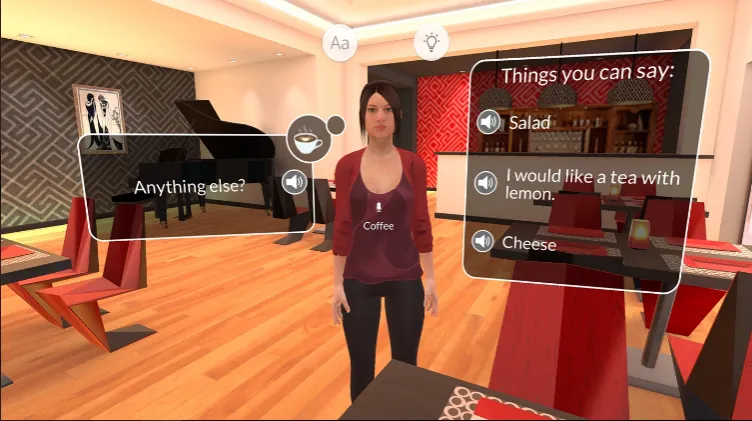ATi Studio’s MondlyVR, a language-learning app with voice recognition, is now available on Google Daydream.
Designed to help students speak their new language from day one, Mondly moves learners from books and flash cards to an immersive environment where they can speak and interact.
MondlyVR promises to teach 30 languages, ranging from those more commonly learned (like English, Japanese, Farsi, Mandarin, and Spanish) to languages usually only studied by native speakers and linguistics nerds (like Finnish and Hungarian.) The number of difficult languages for learners to choose from is impressive- 14 of the available learning choices rank among the hardest for native English speakers to learn.
The support for some languages is a bit shaky. I tried the Gear VR version and found the Spanish speech recognition worked quite well, considering my halting accent. However, things went downhill after I switched to a language I knew better- Japanese. The speech recognition itself was flawless, which makes sense, given that the limited number of syllables makes Japanese an ideal test case for computerized speech recognition.
However, MondlyVR couldn’t parse the language it perfectly transcribed. You can always see how the app interprets your vocalizations at the center of the screen. Using that text readout, I could confirm that the voice recognition software heard my speech correctly. For some reason, though, it wouldn’t accept the input as valid, no matter how many attempts I made. After the 15th time I patiently explained to the conversation partner that I was from America, and she responded with, “I don’t understand,” and I gave up. If I had to guess, the trouble comes from the speech recognition of the software not exporting the perfect string for the rest of the software to interpret. Japanese has three writing systems, and if the parser writes a syllable using the wrong system, the lesson can’t proceed.
The theory of immersion behind MondlyVR is the perfect way to start learning, and it’s far less embarrassing to wade into the shallow end of a new language with a computer than have to embarrass yourself parroting scarcely-understood syllables back to a native speaker. I just wish all the supported languages worked equally well.
The new Daydream version is on sale for $4.99 for the rest of September.






























